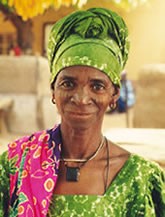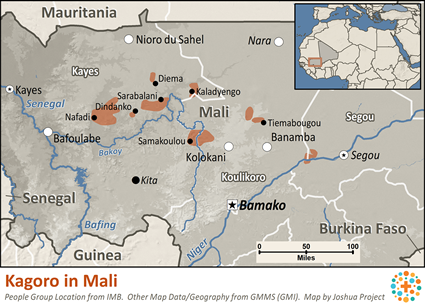The Kagoro of Mali are an ethnic subgroup of the Mande people, residing primarily in the Kaarta-Bine and Gumbu regions in central Mali. They are closely related to the neighboring Bambara, sharing linguistic and cultural ties. While the Kagoro speak their own native language, many are bilingual, speaking Bambara, which is widely used as a lingua franca in Mali.
Historically, the Kagoro have been overshadowed by the larger and more dominant Bambara ethnic group, known for their powerful eighteenth-century kingdoms of Segu and Karta. These kingdoms were later dismantled by militant Muslims in the nineteenth century. Despite these disruptions, some Bambara warlords continued resistance efforts until the French colonization of Mali.
Traditionally, the Kagoro have been agriculturalists, relying heavily on millet and other crops. However, ecological challenges such as prolonged droughts and overgrazing have significantly disrupted their farming practices, forcing adaptations in their way of life.
Despite these challenges, the Kagoro are still primarily subsistence farmers, cultivating staple crops such as millet, sorghum, groundnuts and fonio. Secondary crops include maize, tobacco, manioc, and vegetables grown in home gardens for daily needs. Farm work is a collective activity involving men, women and children. Men typically engage in heavy labor, while women contribute by preparing meals and performing lighter agricultural tasks. Children, especially those aged 12 to 14, assist by leading oxen for plowing and guarding livestock.
Animal husbandry complements agriculture, with cattle, sheep, goats, horses and chickens forming part of the household economy. Neighboring Fulani herdsmen are often employed to tend the livestock, freeing the Kagoro to focus on farming during the short rainy season. Hunting also plays a role in their economy, with antelope, boar, ostrich, and guinea fowl being common game. Honey collection from wild bees is another important activity.
Kagoro villages are structured around extended family units (gwa), which serve as the social and economic backbone of the community. Each gwa provides mutual protection and support in farming. Houses are larger than many other West African communities, often accommodating 60 or more members.
Marriage is a cornerstone of Kagoro society, and every adult is expected to marry. Polygamy is common, and even elderly widows often remarry, as being married is considered essential to a man's prestige. High birth rates are typical, with women averaging eight children, reflecting the importance of family labor and lineage continuity.
Despite their industriousness, the Kagoro face significant challenges with illiteracy. Islamic schools exist in some villages, but education remains underdeveloped as children are needed for farm labor.
The Kagoro are predominantly animists, believing that spirits inhabit non-human entities such as animals, plants and even inanimate objects. Ancestor worship is central to their spirituality, with rites conducted to honor and seek guidance from departed family members. The eldest family member often serves as the intermediary between the living and the ancestral spirits.
They often make offerings of millet flour and water to appease ancestral spirits, whom they believe occasionally manifest as animals or plants. These spiritual practices are deeply integrated into daily life and serve to maintain harmony within the community and with nature.
Islam has made inroads among the Kagoro, mainly through the influence of neighboring groups and establishing Islamic schools. However, traditional animist practices remain prevalent in most communities.
Agricultural Sustainability: Drought and overgrazing have significantly disrupted traditional farming practices. Access to improved irrigation techniques, drought-resistant crops, and sustainable grazing systems could alleviate these challenges.
Education and Literacy: Illiteracy remains widespread, and younger generations have limited access to schools and educational resources. Expanding both Islamic and secular education systems could significantly improve opportunities for them.
Healthcare and Social Services: Access to healthcare is minimal, with common ailments often left untreated. Improved healthcare infrastructure, vaccinations, and education on hygiene and nutrition are critical needs.
Economic Opportunities: Diversifying income sources beyond agriculture—such as promoting small-scale enterprises, crafts and trade—could help reduce economic vulnerability, especially during droughts.
Infrastructure Development: Better road networks, access to clean water, and electrification would improve overall quality of life and economic productivity.
Climate Adaptation: Ecological changes pose ongoing threats, so environmental programs focusing on reforestation, soil preservation and renewable energy solutions would provide long-term benefits.
The Bible has been translated into Bambara, the more widely spoken language in the region, which is also spoken by the Kagoro. Christian organizations, such as the Bible Society of Mali, have been active in distributing scriptures and Christian materials in various local languages like the JESUS Film. However, access to materials can still be limited in rural areas where the Kagoro primarily reside.
Ask the Lord to call Christian educators who are willing to minister Jesus's love to the Kagoro of Mali.
Pray that God will give the Kagoro believers boldness to disciple others in the ways of Christ.
Pray for the Lord to send dreams and visions to Kagoro family leaders who can open their families to Christ's ways.
Ask the Lord to bring forth many Christian fellowships that will honor the name of the Lord among the Kagoro people.
Scripture Prayers for the Kagoro in Mali.
https://kagorohistory.blogspot.com/2013/10/kagoro-heroes-from-1905-1945.html
| Profile Source: Joshua Project |

























